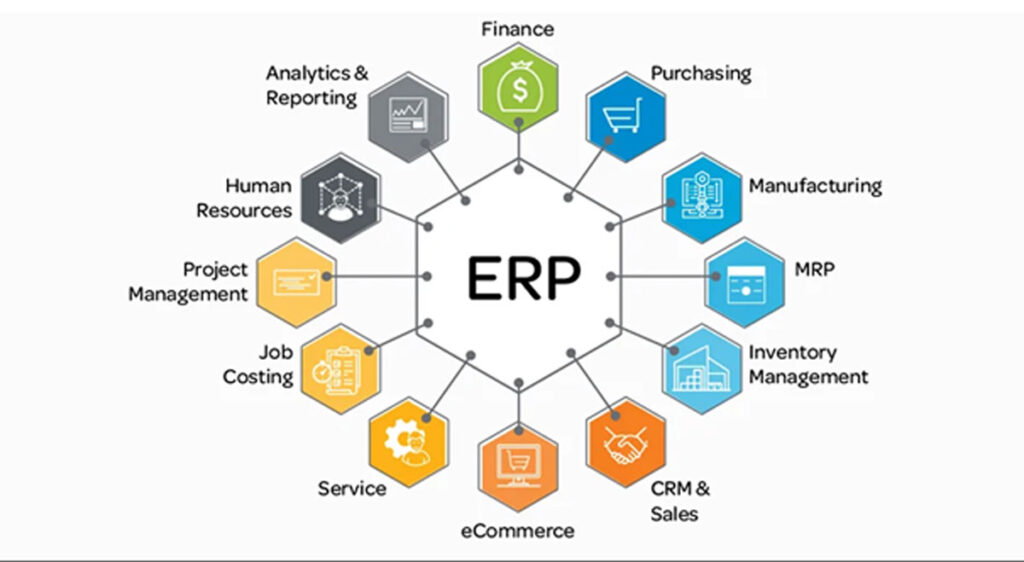Author I Engr. Hasib S A Choudhury I BSC (BUET), MSC (USA) I Currently working as Sr. SAP Consultant at MGI, Dhaka, Bangladesh
Enterprise Resource Planning (ERP) software has revolutionized how organizations manage their operations, fostering integration, automation, and efficiency. In Bangladesh, the adoption of ERP solutions has seen a steady rise, particularly in industries that form the backbone of the nation’s economy, such as textiles, pharmaceuticals, and manufacturing. Despite its challenges, ERP software has immense potential to streamline business processes in Bangladesh, driving both organizational growth and national economic development.
Understanding ERP Software and Its Functions
ERP software is designed to centralize and integrate core business functions such as finance, procurement, supply chain, human resources, and customer relationship management. By offering a unified platform, ERP minimizes redundancies, improves accuracy, and enhances decision-making. In the context of Bangladesh, where many businesses are transitioning from traditional management methods to digital solutions, ERP provides a much-needed foundation for sustainable scalability.

ERP Adoption in Key Sectors
1. Ready-Made Garments (RMG):
The RMG sector is Bangladesh’s largest export industry, contributing significantly to the national GDP. ERP software helps textile companies manage complex supply chains, track inventory levels, and optimize production schedules. By automating compliance monitoring, ERP systems also ensure adherence to international standards, a crucial factor for maintaining Bangladesh’s competitive edge in global markets.
2. Pharmaceuticals:
Bangladesh’s pharmaceutical industry has emerged as a growing sector with exports to over 150 countries. ERP systems enable pharmaceutical companies to manage stringent regulatory requirements, monitor production quality, and maintain accurate inventory of raw materials and finished goods. This ensures efficient operations while meeting the demands of both local and international markets.
3. Manufacturing and Logistics:
Manufacturing firms in Bangladesh, especially those in electronics and consumer goods, use ERP systems to enhance operational efficiency. Logistics companies, essential for supply chain management, utilize ERP to optimize route planning, track shipments, and improve delivery timelines, reducing costs and boosting customer satisfaction.
Benefits of ERP Software in the Bangladeshi Context
The adoption of Enterprise Resource Planning (ERP) software is increasingly transforming business operations in Bangladesh. In a developing economy like Bangladesh, where industries such as textiles, pharmaceuticals, and manufacturing play critical roles, ERP systems bring several advantages, making businesses more efficient and globally competitive. Below are the key benefits of ERP software in the Bangladeshi context.
1. Centralized Data Management
ERP systems consolidate various business functions into a single platform, providing organizations with a centralized database. This eliminates silos between departments, ensuring better communication and data-sharing. For Bangladeshi businesses, particularly in manufacturing and logistics, this centralization streamlines operations and reduces errors caused by manual data entry.
2. Enhanced Operational Efficiency
ERP software automates routine tasks such as inventory tracking, order processing, and payroll management. For example, in Bangladesh’s ready-made garments (RMG) sector, ERP systems help optimize production schedules and supply chain operations, reducing delays and wastage. Automation allows businesses to focus on strategic growth rather than mundane administrative tasks.
3. Better Decision-Making
With real-time data and analytics, ERP software equips businesses with actionable insights. Managers can access up-to-date reports on financial performance, production outputs, and sales trends. This capability is invaluable for Bangladeshi organizations aiming to compete globally, as it helps in adapting quickly to market demands and improving forecasting accuracy.
4. Regulatory Compliance
Industries like pharmaceuticals and textiles in Bangladesh face stringent international compliance requirements. ERP systems help track and document all processes, ensuring adherence to regulatory standards like Good Manufacturing Practices (GMP) and environmental guidelines. This enhances the reputation of Bangladeshi exports in global markets.
5. Cost Savings
Although the initial investment in ERP systems can be high, long-term benefits outweigh the costs. By reducing operational inefficiencies, minimizing redundancies, and improving inventory management, businesses save significant resources. For SMEs in Bangladesh, cloud-based ERP solutions provide an affordable alternative to traditional on-premises systems.
6. Scalability for Growth
Bangladeshi enterprises, particularly SMEs, are experiencing rapid growth as they expand locally and internationally. ERP software supports this growth by providing scalable solutions. As businesses grow, ERP systems can be upgraded to accommodate more users, modules, and functionalities, making them ideal for evolving organizations.
7. Improved Customer Satisfaction
By integrating customer relationship management (CRM) functionalities, ERP software enhances customer service. Businesses can track orders, manage complaints, and personalize services effectively. This is especially beneficial in sectors like retail and e-commerce in Bangladesh, where customer retention is key to success.
8. Supply Chain Optimization
For Bangladesh, efficient supply chain management is crucial. ERP systems provide real-time tracking of raw materials and finished goods, reducing bottlenecks and ensuring timely delivery. In the RMG sector, ERP systems help manage global supply chains, enhancing the country’s position as a leading apparel exporter.
9. Reduced Manual Errors
Manual data entry is prone to errors, leading to financial discrepancies and operational disruptions. ERP systems eliminate such risks by automating data collection and processing. This ensures higher accuracy and consistency, a critical factor for Bangladeshi businesses aiming to build trust with international clients.
10. Competitive Edge in the Global Market
As Bangladesh becomes more integrated into the global economy, businesses face increasing competition. ERP systems provide the tools necessary to maintain quality, meet deadlines, and offer competitive pricing. This gives Bangladeshi organizations an edge in industries like textiles and pharmaceuticals, where efficiency and compliance are paramount.
Challenges in ERP Implementation
Despite its benefits, implementing ERP systems in Bangladesh faces several challenges:
- High Initial Investment: The cost of purchasing and customizing ERP software is significant, especially for small and medium-sized enterprises (SMEs).
- Skill Gap: A lack of trained professionals to manage ERP systems creates a barrier to adoption.
- Resistance to Change: Many organizations rely on traditional processes, leading to hesitation in adopting digital solutions.
- Infrastructure Limitations: Insufficient IT infrastructure, particularly in rural areas, hampers ERP deployment.
Opportunities for Growth
Bangladesh’s growing focus on digital transformation offers promising opportunities for ERP adoption. Proper government initiatives can promote technology integration across industries. Local ERP vendors are emerging to provide cost-effective, customized solutions tailored to the needs of Bangladeshi businesses. Cloud-based ERP systems are also gaining popularity, reducing the need for expensive on-premises hardware.
Future Outlook
As Bangladesh continues its journey toward industrialization and globalization, the usage of ERP software is expected to expand. The increasing adoption of technology in SMEs, supported by government policies and training initiatives, will further drive ERP penetration. By overcoming current challenges, ERP systems can play a pivotal role in fostering innovation, improving productivity, and sustaining economic growth.
Conclusion
ERP software is not just a tool for operational efficiency but a catalyst for business transformation. In Bangladesh, its usage across diverse industries is gradually bridging the gap between traditional practices and modern technological advancements. ERP software offers Bangladeshi businesses a pathway to modernize operations, enhance productivity, and meet global standards. By addressing common challenges such as inefficiencies and compliance issues, ERP systems pave the way for sustainable growth. As more organizations in Bangladesh adopt ERP solutions, they stand to benefit from improved scalability, cost savings, and enhanced competitiveness, driving the nation’s economic progress.

Leave a Reply
You must be logged in to post a comment.